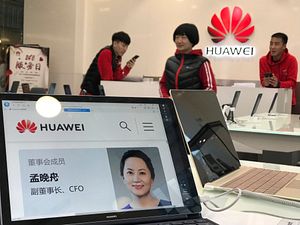A Canadian judge ruled Wednesday the U.S. extradition case against a senior Huawei executive can continue to the next stage, a decision that is expected to further harm relations between China and Canada.
Canada arrested China’s Meng Wanzhou, the daughter of Huawei’s founder and chief financial officer of the company, at Vancouver’s airport in late 2018. The United States wants her extradited to face fraud charges. Her arrest infuriated Beijing, which sees her case as a political move designed to prevent China’s rise.
The United States accuses Huawei of using a Hong Kong shell company to sell equipment to Iran in violation of U.S. sanctions. It says Meng, 48, committed fraud by misleading the HSBC bank about the company’s business dealings in Iran.
Meng’s lawyers argued during a hearing in January that the case is really about U.S. sanctions against Iran, not a fraud case. They maintain that since Canada does not have similar sanctions against Iran, no fraud occurred under its laws.
Associate Chief Justice Heather Holmes said in her decision the allegations against Meng could constitute a crime in Canada and the extradition could therefore proceed.
“Ms. Meng’s approach to the double criminality analysis would seriously limit Canada’s ability to fulfill its international obligations in the extradition context for fraud and other economic crimes,” Holmes wrote.
Holmes said Canada did not have economic sanctions against Iran at the time but noted the sanctions used by the United States “were not fundamentally contrary to Canadian values.”
Meng’s legal team is scheduled to be back in court on June 15 and will argue that Canada Border Services, the Royal Canadian Mounted Police, and the FBI violated Meng’s rights while collecting evidence before she was actually arrested. Extradition cases typically take years in Canada.
The ruling against Meng is expected to erode already damaged relations between Beijing and Ottawa.
In apparent retaliation for Meng’s arrest, China detained former Canadian diplomat Michael Kovrig and Canadian entrepreneur Michael Spavor. China has also placed restrictions on various Canadian exports to China, including canola oil seed. China also handed a death sentence to a convicted Canadian drug smuggler in a sudden retrial.
Huawei is the biggest global supplier of network gear for phone and internet companies. The company represents China’s progress in becoming a technological power and has been a subject of U.S. security concerns. Some analysts say Chinese companies have flouted international rules and norms amid allegations of technology theft.
Speaking the day before the ruling, Chinese Foreign Ministry spokesperson Zhao Lijian urged Canada to “immediately correct its mistake, release Ms. Meng and ensure her safe return to China at an early date so as to avoid any continuous harm to China-Canada relations.”
Zhao accused the U.S. and Canada of having “abused their bilateral extradition treaty,” calling Meng’s case “a serious political incident that grossly violates the legitimate rights and interests of the Chinese citizen.”
Canada’s government, however, has stressed that it cannot intervene in the workings of the judicial system. The Canadian Justice Department said in a statement that a judge at further hearings will determine whether or not Meng’s alleged conduct provides sufficient evidence of fraud to meet the test for extradition.
“An independent judge will determine whether that test is met. This speaks to the independence of Canada’s extradition process,” the statement said. “The Minister does not personally make any decisions related to an extradition proceeding until and unless the judge commits the person for extradition.”
By Jim Morris for The Associated Press with additional reporting by The Diplomat.

































